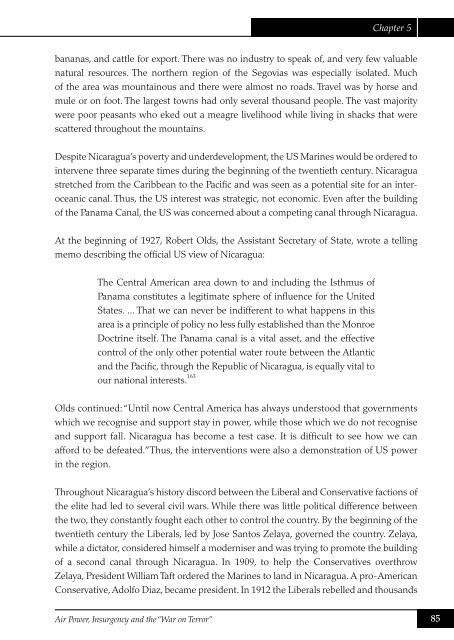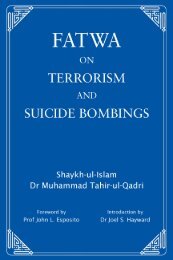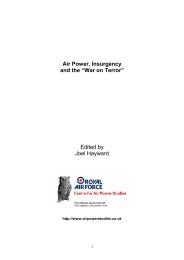Air Power, Insurgency and the âWar on Terrorâ - Prof. Joel Hayward's ...
Air Power, Insurgency and the âWar on Terrorâ - Prof. Joel Hayward's ...
Air Power, Insurgency and the âWar on Terrorâ - Prof. Joel Hayward's ...
You also want an ePaper? Increase the reach of your titles
YUMPU automatically turns print PDFs into web optimized ePapers that Google loves.
Chapter 5<br />
bananas, <str<strong>on</strong>g>and</str<strong>on</strong>g> cattle for export. There was no industry to speak of, <str<strong>on</strong>g>and</str<strong>on</strong>g> very few valuable<br />
natural resources. The nor<str<strong>on</strong>g>the</str<strong>on</strong>g>rn regi<strong>on</strong> of <str<strong>on</strong>g>the</str<strong>on</strong>g> Segovias was especially isolated. Much<br />
of <str<strong>on</strong>g>the</str<strong>on</strong>g> area was mountainous <str<strong>on</strong>g>and</str<strong>on</strong>g> <str<strong>on</strong>g>the</str<strong>on</strong>g>re were almost no roads. Travel was by horse <str<strong>on</strong>g>and</str<strong>on</strong>g><br />
mule or <strong>on</strong> foot. The largest towns had <strong>on</strong>ly several thous<str<strong>on</strong>g>and</str<strong>on</strong>g> people. The vast majority<br />
were poor peasants who eked out a meagre livelihood while living in shacks that were<br />
scattered throughout <str<strong>on</strong>g>the</str<strong>on</strong>g> mountains.<br />
Despite Nicaragua’s poverty <str<strong>on</strong>g>and</str<strong>on</strong>g> underdevelopment, <str<strong>on</strong>g>the</str<strong>on</strong>g> US Marines would be ordered to<br />
intervene three separate times during <str<strong>on</strong>g>the</str<strong>on</strong>g> beginning of <str<strong>on</strong>g>the</str<strong>on</strong>g> twentieth century. Nicaragua<br />
stretched from <str<strong>on</strong>g>the</str<strong>on</strong>g> Caribbean to <str<strong>on</strong>g>the</str<strong>on</strong>g> Pacific <str<strong>on</strong>g>and</str<strong>on</strong>g> was seen as a potential site for an interoceanic<br />
canal. Thus, <str<strong>on</strong>g>the</str<strong>on</strong>g> US interest was strategic, not ec<strong>on</strong>omic. Even after <str<strong>on</strong>g>the</str<strong>on</strong>g> building<br />
of <str<strong>on</strong>g>the</str<strong>on</strong>g> Panama Canal, <str<strong>on</strong>g>the</str<strong>on</strong>g> US was c<strong>on</strong>cerned about a competing canal through Nicaragua.<br />
At <str<strong>on</strong>g>the</str<strong>on</strong>g> beginning of 1927, Robert Olds, <str<strong>on</strong>g>the</str<strong>on</strong>g> Assistant Secretary of State, wrote a telling<br />
memo describing <str<strong>on</strong>g>the</str<strong>on</strong>g> official US view of Nicaragua:<br />
The Central American area down to <str<strong>on</strong>g>and</str<strong>on</strong>g> including <str<strong>on</strong>g>the</str<strong>on</strong>g> Isthmus of<br />
Panama c<strong>on</strong>stitutes a legitimate sphere of influence for <str<strong>on</strong>g>the</str<strong>on</strong>g> United<br />
States. ... That we can never be indifferent to what happens in this<br />
area is a principle of policy no less fully established than <str<strong>on</strong>g>the</str<strong>on</strong>g> M<strong>on</strong>roe<br />
Doctrine itself. The Panama canal is a vital asset, <str<strong>on</strong>g>and</str<strong>on</strong>g> <str<strong>on</strong>g>the</str<strong>on</strong>g> effective<br />
c<strong>on</strong>trol of <str<strong>on</strong>g>the</str<strong>on</strong>g> <strong>on</strong>ly o<str<strong>on</strong>g>the</str<strong>on</strong>g>r potential water route between <str<strong>on</strong>g>the</str<strong>on</strong>g> Atlantic<br />
<str<strong>on</strong>g>and</str<strong>on</strong>g> <str<strong>on</strong>g>the</str<strong>on</strong>g> Pacific, through <str<strong>on</strong>g>the</str<strong>on</strong>g> Republic of Nicaragua, is equally vital to<br />
our nati<strong>on</strong>al interests. 163<br />
Olds c<strong>on</strong>tinued: “Until now Central America has always understood that governments<br />
which we recognise <str<strong>on</strong>g>and</str<strong>on</strong>g> support stay in power, while those which we do not recognise<br />
<str<strong>on</strong>g>and</str<strong>on</strong>g> support fall. Nicaragua has become a test case. It is difficult to see how we can<br />
afford to be defeated.” Thus, <str<strong>on</strong>g>the</str<strong>on</strong>g> interventi<strong>on</strong>s were also a dem<strong>on</strong>strati<strong>on</strong> of US power<br />
in <str<strong>on</strong>g>the</str<strong>on</strong>g> regi<strong>on</strong>.<br />
Throughout Nicaragua’s history discord between <str<strong>on</strong>g>the</str<strong>on</strong>g> Liberal <str<strong>on</strong>g>and</str<strong>on</strong>g> C<strong>on</strong>servative facti<strong>on</strong>s of<br />
<str<strong>on</strong>g>the</str<strong>on</strong>g> elite had led to several civil wars. While <str<strong>on</strong>g>the</str<strong>on</strong>g>re was little political difference between<br />
<str<strong>on</strong>g>the</str<strong>on</strong>g> two, <str<strong>on</strong>g>the</str<strong>on</strong>g>y c<strong>on</strong>stantly fought each o<str<strong>on</strong>g>the</str<strong>on</strong>g>r to c<strong>on</strong>trol <str<strong>on</strong>g>the</str<strong>on</strong>g> country. By <str<strong>on</strong>g>the</str<strong>on</strong>g> beginning of <str<strong>on</strong>g>the</str<strong>on</strong>g><br />
twentieth century <str<strong>on</strong>g>the</str<strong>on</strong>g> Liberals, led by Jose Santos Zelaya, governed <str<strong>on</strong>g>the</str<strong>on</strong>g> country. Zelaya,<br />
while a dictator, c<strong>on</strong>sidered himself a moderniser <str<strong>on</strong>g>and</str<strong>on</strong>g> was trying to promote <str<strong>on</strong>g>the</str<strong>on</strong>g> building<br />
of a sec<strong>on</strong>d canal through Nicaragua. In 1909, to help <str<strong>on</strong>g>the</str<strong>on</strong>g> C<strong>on</strong>servatives overthrow<br />
Zelaya, President William Taft ordered <str<strong>on</strong>g>the</str<strong>on</strong>g> Marines to l<str<strong>on</strong>g>and</str<strong>on</strong>g> in Nicaragua. A pro-American<br />
C<strong>on</strong>servative, Adolfo Diaz, became president. In 1912 <str<strong>on</strong>g>the</str<strong>on</strong>g> Liberals rebelled <str<strong>on</strong>g>and</str<strong>on</strong>g> thous<str<strong>on</strong>g>and</str<strong>on</strong>g>s<br />
<str<strong>on</strong>g>Air</str<strong>on</strong>g> <str<strong>on</strong>g>Power</str<strong>on</strong>g>, <str<strong>on</strong>g>Insurgency</str<strong>on</strong>g> <str<strong>on</strong>g>and</str<strong>on</strong>g> <str<strong>on</strong>g>the</str<strong>on</strong>g> “War <strong>on</strong> Terror” 85





